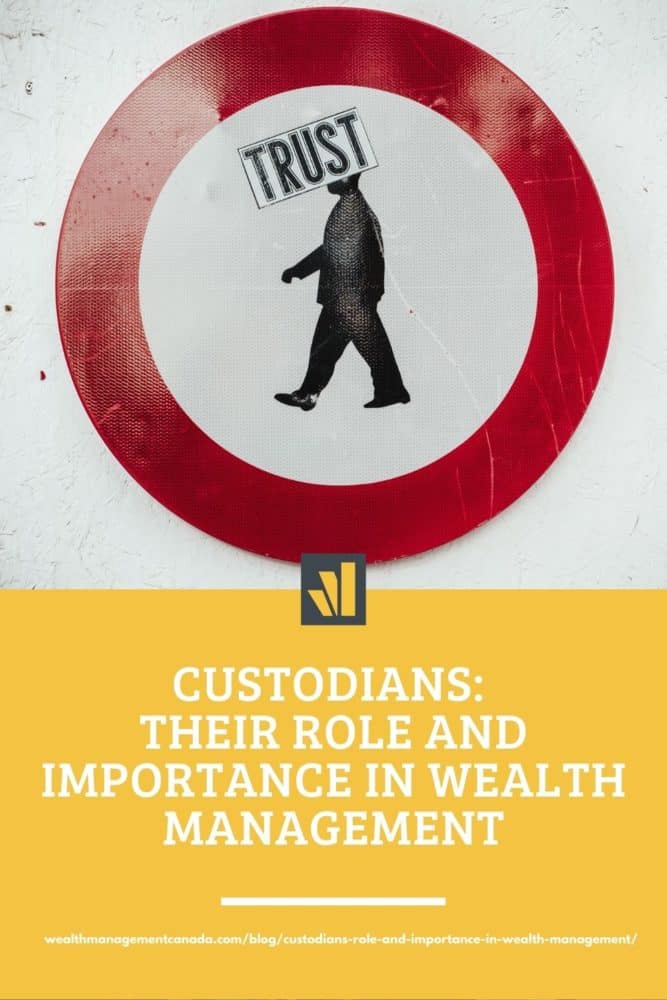Entrusting your life savings with an advisor can ignite skepticism. When we look at Bernie Maddoff or his Canadian equivalent Earl Jones, we see everyday people unknowingly losing millions of dollars over the span of decades. They are left with nothing once the crime has been uncovered. As a result, we need to look at the importance of custodians in Canada.
How can we protect ourselves from falling victim to fraudsters? You don’t need to become an investment expert. However, it’s important to understand the different parties involved in managing our assets.

Table of contents
What is asset management?
As an investor, you’ll likely be in contact with the asset management firm at least quarterly. This can vary depending on the type of relationship you have.
Asset management is a service provided by a financial services institution (eg. an investment bank) or individual — and is exactly how it sounds. Asset managers configure their client’s portfolios to best meet their identified needs and goals, centering on the client’s unique situation, preferences, and risk tolerance. While “assets” does broadly refer to a person’s complete financial holdings, asset managers are primarily focused on investments — stocks, bonds, mutual funds, and ETFs.
At its core, asset management is about making the best investment possible for clients, with a strong focus on growth.
How do asset management firms work?
An asset management firm typically consists of the portfolio manager(s) and their team who will assess your individual needs and circumstances. They will, in turn, develop an investment policy statement, or IPS. The IPS covers a number of factors that include your return objective, risk tolerance, asset allocation and other constraints. Your portfolio manager will use the parameters outlined in the IPS to build a portfolio with a variety of investments like stocks and bonds.
The firm may also offer pooled funds. These combine a group of client assets with similar investment mandates into a basket of securities. With these funds, you don’t own the underlying securities but rather units of the actual fund. Examples include a Canadian Value Equity Fund or Income Balanced Fund.
Your portfolio manager has trading authority, which means he or she can submit, buy, or sell trades from your portfolio. However, it’s important to note that neither the manager nor the firm directly holds your assets.
Related Reading: Wealth Management Importance: The relationship with your wealth manager
What are custodians in asset management?
Simply put, custodians are reputable financial institutions that hold specific, important responsibilities. In addition to safekeeping your assets, the custodian arranges trade settlement that involves ensuring your cash goes to the appropriate party for purchases and confirming receipt of funds for sales.
Your portfolio manager cannot directly access the assets in your account. As a result, your assets are with your custodian, reducing the risk of theft. Assets are also separate from the custodian’s corporate assets, which means your money would be safe in the event your custodian seized operations.
The custodian also acts as the record keeper that provides timely account reports outlining your holdings and transactions that occurred over a given time (i.e. purchases, sales, dividend or income payments, fees). The report you receive from your custodian is completely independent of the asset report you receive from your portfolio manager.
Related Reading: What is a trust fund in Canada?
Types of custodians in Canada
There are two types of custodians in Canada: investment brokerage firms and trust companies.
Investment brokerage firms as custodians
In an investment brokerage firm, custodian services are part of an overall wealth management offering. However, the advisor will still not have access to your account. There are two regulatory bodies that oversee brokerage firms: The Canadian Securities Administrator (CSA) and the Investment Industry Regulatory Organization of Canada (IIROC).
The CSA is an aggregate of all the provincial and territorial securities regulators in Canada. They coordinate initiatives across the country, but each securities regulator is responsible for handling complaints regarding securities violations in their respective jurisdictions. The provincial regulator in Ontario is the Ontario Securities Commission (OSC).

START WORKING WITH A WEALTH MANAGER NOW
The main objective of the CSA is to protect Canadian investors from fraudulent and improper investment practices, while promoting fair and efficient capital markets through the creation of consistent securities regulations and policies. The CSA also provides a wide variety of educational materials, from explaining the stock markets to identifying investment scams.
The CSA oversees IIROC, a non-governmental agency that has the power to create and enforce regulations. This is otherwise known as a self-regulatory organization (SRO).
IIROC manages investment dealers (individuals or firms that can sell investment products), advisors, and the trading activity in the Canadian debt and equity markets. In the event of a violation, IIROC can impose fines and other disciplinary actions against the guilty party. Most IIROC regulated firms also participate in the Canadian Investor Protection Fund (CIPF). The CIPF covers individual investors in case the firm goes bankrupt.
Trust companies as custodians
The second type of custodian is the trust company. Unlike a brokerage firm, its custodian services are separate from the investment advisory firm. Trust companies are regulated through the Office of The Superintendent of Financial Institutions (OSFI).
OSFI aims to protect investors and implement policies and procedures to manage risks taken by these companies. In other words, OFSI monitors these companies to ensure they are in good shape financially. Similar to the CIPF, most OSFI regulated firms participate in the Canadian Deposit Insurance Company (CDIC) that guarantees funds subject to certain restrictions.
OSFI also acts as an information database for Canadian institutions. They maintain and post communications on relevant news and disruptors in the industry. For instance, in January 2019, they released a memo on cybersecurity threats, an issue that is becoming more prevalent and sophisticated. In this memo, OSFI warned about the dangers this threat would have to the global markets and businesses.
Related Reading: Investment Management Fees: A Complete Guide
Importance of custodians in wealth management
We may not realize it but custodians in Canada are arguably the best line of defense against asset mismanagement. It’s important to understand that the responsibility a custodian holds is independent of an asset management firm’s duties. Review your asset reports from your custodians regularly, and make sure they are separate from any advice. This will surely reduce the chances of misconduct within your investment accounts.

START WORKING WITH A WEALTH MANAGER NOW
We believe all Canadians should have a safe place to ask questions.
We’re finance nerds who want to share our love of wealth management with Canadians. Our experience has taught us that many Canadians don’t have a resource to turn to when they want to make a wealth management change or simply want to know more about the Canadian investment landscape. Whether you’re an experienced investor or a beginner we’d love to hear from you to see how we might be able to help you out.
It may seem unusual to hear this, but we sincerely want to help investors. We want to show investors the good side of the financial industry. Our belief is that the best resources shouldn’t only be available to the wealthiest individuals. We created WMC with the vision of helping all Canadians gain access to the best financial resources in order to invest their money wisely based on informed decisions.
Get started by completing the online questionnaire or send us a message through our contact form.
Read More: How to Choose a Wealth Management Firm
